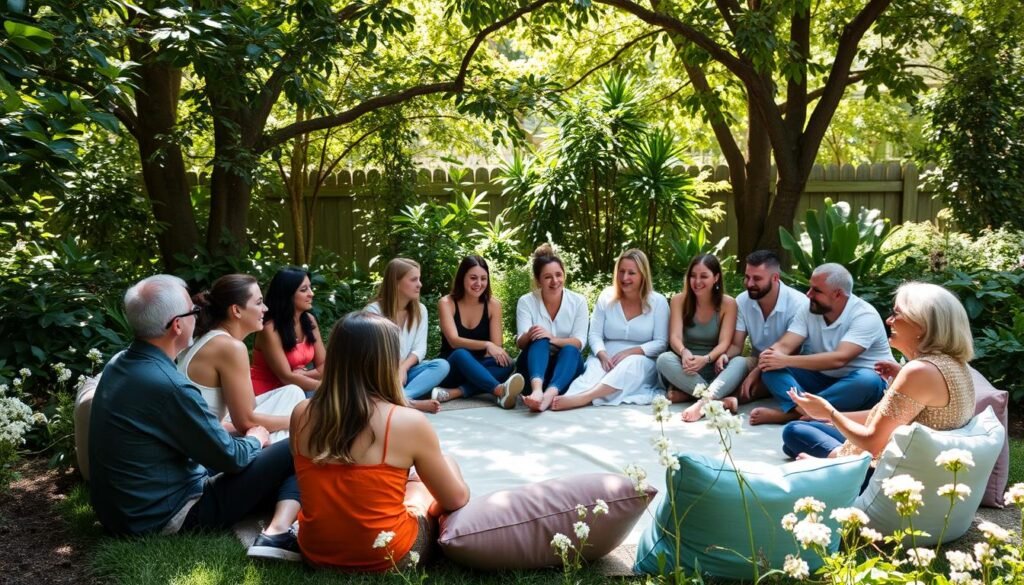
Strategies to Reduce Anxiety and Achieve Calm
Anxiety is a common condition that affects millions of people, causing a range of symptoms of anxiety that can interfere with daily life. Understanding anxiety and its effects is crucial to managing the condition and achieving a sense of calm. Anxiety can manifest in different ways, from feelings of worry and fear to physical symptoms such as a racing heart and trembling hands.
Reducing anxiety requires a comprehensive approach that incorporates various strategies, including lifestyle changes, natural techniques, and professional help. By understanding the causes of anxiety and its impact on daily life, individuals can take the first step towards managing their symptoms of anxiety and improving their overall well-being.

Introduction to Anxiety Management
Effective anxiety management involves a combination of self-help techniques, professional therapy, and support from others. By adopting healthy habits, practicing relaxation techniques, and seeking help when needed, individuals can reduce their anxiety and achieve a more balanced life. Managing symptoms of anxiety is a process that takes time and effort, but with the right strategies and support, it is possible to overcome anxiety and live a fulfilling life.
Key Takeaways
- Anxiety is a common condition that affects millions of people
- Understanding anxiety and its effects is crucial to managing the condition
- Reducing anxiety requires a comprehensive approach that incorporates various strategies
- Lifestyle changes, natural techniques, and professional help can help manage symptoms of anxiety
- Effective anxiety management involves a combination of self-help techniques, professional therapy, and support from others
- Managing anxiety is a process that takes time and effort, but with the right strategies and support, it is possible to overcome anxiety
Understanding Anxiety and Its Effects
Anxiety is a common mental health condition that affects millions worldwide. It manifests in various ways, impacting daily life and overall well-being.
Definition of Anxiety
Anxiety is characterized by feelings of worry, nervousness, or fear that are strong enough to interfere with one’s daily activities. It is a natural response to stress but becomes problematic when persistent.
Common Symptoms
Recognizing the symptoms of anxiety is crucial for early intervention. Common signs include:
- Excessive worry or fear
- Restlessness or feeling on edge
- Rapid heartbeat
- Difficulty concentrating
- Sleep disturbances
Prevalence and Impact
Anxiety disorders are among the most prevalent mental health issues globally. According to recent studies, anxiety affects approximately 18% of the population, making it a significant public health concern. The impact of anxiety extends beyond personal distress, affecting professional performance and social interactions.
Understanding anxiety causes helps in addressing its effects effectively. Factors such as genetics, brain chemistry, and life events contribute to the development of anxiety disorders.
| Region | Prevalence of Anxiety (%) |
|---|---|
| North America | 19 |
| Europe | 16 |
| Asia | 14 |
| Africa | 13 |
| Australia | 17 |
The Science Behind Anxiety
Anxiety causes stem from intricate interactions within the brain’s structure and chemistry. Understanding these mechanisms sheds light on why anxiety manifests in various forms.
The Brain’s Role in Anxiety
Several brain regions, including the amygdala and prefrontal cortex, are pivotal in processing fear and emotional responses. Neurotransmitters like serotonin and dopamine play crucial roles in regulating mood and anxiety causes. For an in-depth exploration, refer to this scientific study on anxiety’s neurobiological basis.
The Fight or Flight Response
The fight or flight response is an evolutionary mechanism designed to protect us from threats. When triggered, it releases hormones that prepare the body to either confront or flee from danger. In today’s context, chronic activation of this response contributes significantly to anxiety causes, leading to prolonged stress and emotional strain.
Natural Techniques for Anxiety Relief
Exploring natural remedies for anxiety can provide effective anxiety relief without the need for medication. These anxiety management techniques are accessible and can be easily incorporated into daily routines.
Mindfulness and Meditation
Mindfulness and meditation help calm the mind by focusing on the present moment. Regular practice can reduce stress, increase self-awareness, and promote emotional balance. To get started, set aside a few minutes each day to sit quietly, breathe deeply, and observe your thoughts without judgment.
Breathing Exercises
Breathing exercises are simple yet powerful tools for anxiety relief. One effective technique is the 4-7-8 method:
- Inhale through your nose for 4 seconds.
- Hold your breath for 7 seconds.
- Exhale slowly through your mouth for 8 seconds.
Repeat this cycle several times to help calm your nervous system.
Physical Activity
Engaging in regular physical activity is a proven anxiety management technique. Activities such as walking, jogging, yoga, or swimming can release endorphins, improve mood, and reduce tension. Aim for at least 30 minutes of exercise most days of the week to experience significant benefits.
Lifestyle Changes to Combat Anxiety
Adopting healthy lifestyle habits can significantly enhance your anxiety management techniques and aid in coping with anxiety. Making intentional changes in daily routines can create a foundation for better mental well-being.
Nutrition and Diet
A balanced diet plays a crucial role in managing anxiety. Incorporate foods rich in omega-3 fatty acids, such as salmon and walnuts, which are known to support brain health. Reduce intake of caffeine and sugar, as they can exacerbate anxiety symptoms.
Sleep Hygiene
Quality sleep is essential for emotional regulation. Establish a consistent sleep schedule by going to bed and waking up at the same time each day. Create a calming bedtime routine, such as reading or taking a warm bath, to improve sleep quality.
Establishing Routine
Having a structured daily routine can provide a sense of predictability and control, which is beneficial for coping with anxiety. Plan your day with regular times for meals, work, exercise, and relaxation to maintain balance and reduce stress.
The Power of Positive Thinking
Embracing positive thinking is a fundamental anxiety management technique. It helps shift focus from negative thoughts, enhancing overall well-being.
Techniques for Positive Self-Talk
Positive self-talk can significantly aid in coping with anxiety. Here are some effective methods:
- Affirmations: Repeating positive statements to build self-confidence.
- Reframing: Turning negative thoughts into positive ones.
- Visualization: Imagining successful outcomes to reduce anxiety.
Journaling for Emotional Clarity
Journaling is a powerful tool for emotional clarity and anxiety management. It allows individuals to express feelings and track their progress.
- Set aside time daily to write down thoughts.
- Focus on positive experiences and achievements.
- Reflect on patterns to understand anxiety triggers.
| Anxiety Management Technique | Description | Benefits |
|---|---|---|
| Positive Self-Talk | Using encouraging words to challenge negative thoughts. | Boosts self-esteem and reduces anxiety levels. |
| Journaling | Writing down thoughts and feelings regularly. | Enhances emotional clarity and identifies anxiety triggers. |
| Affirmations | Repeating positive statements to reinforce self-belief. | Improves mood and fosters a positive mindset. |
Seeking Support from Others
Connecting with others is a vital step in managing anxiety. Building a network of understanding individuals can provide immense relief and encouragement.
The Importance of Community
Engaging with a community offers a sense of belonging and shared experiences. Whether through support groups or online forums, community support can:
- Provide a safe space to express feelings
- Offer practical advice and coping strategies
- Reduce feelings of isolation

Professional Help Options
Seeking professional help is a proactive approach to managing anxiety therapy. Various options are available to suit individual needs:
- Therapy: Regular sessions with a licensed therapist
- Counseling: Short-term guidance to address specific issues
- Psychiatric Care: Medical treatment and medication management
| Option | Description | Benefits |
|---|---|---|
| Therapy | Long-term treatment with a licensed therapist | In-depth exploration of anxiety triggers |
| Counseling | Short-term sessions focused on specific issues | Immediate coping strategies |
| Psychiatric Care | Medical treatment including medication | Biological approach to anxiety management |
Cognitive Behavioral Therapy (CBT)
Cognitive Behavioral Therapy (CBT) is a proven approach in anxiety treatment. It focuses on identifying and changing negative thought patterns that contribute to anxiety.
What is CBT?
CBT is a type of anxiety therapy that helps individuals understand the connection between their thoughts, feelings, and behaviors. By addressing distorted thinking, CBT enables people to develop healthier ways to manage stress and anxiety.
How CBT Helps Reduce Anxiety
Through techniques like cognitive restructuring and exposure therapy, CBT assists in challenging irrational fears and gradually facing anxiety-provoking situations. This method not only alleviates symptoms but also equips individuals with tools for long-term anxiety management.
Incorporating CBT into daily routines can significantly improve mental health. For more strategies on managing anxiety, visit effective daily strategies.
Alternative Therapies for Anxiety
Exploring anxiety treatment options beyond traditional methods can provide additional relief. Alternative therapies offer complementary approaches to managing anxiety effectively.
Acupuncture and Its Benefits
Acupuncture involves inserting thin needles into specific points on the body. This practice aims to balance the body’s energy flow, which may help reduce anxiety symptoms. Studies suggest that acupuncture can lower stress levels and promote relaxation, making it a valuable natural remedy for anxiety.
Aromatherapy and Essential Oils
Aromatherapy utilizes essential oils to enhance well-being. Certain oils, such as lavender, chamomile, and bergamot, are known for their calming properties. These oils can be diffused in the air, applied topically, or added to baths to help alleviate anxiety. Incorporating aromatherapy into your daily routine can serve as an effective natural remedy for anxiety.

While these alternative therapies can support anxiety management, it’s important to consult with a healthcare provider before starting any new treatment. Integrating these methods with professional medical advice can create a comprehensive approach to overcoming anxiety.
Creating a Calming Environment
Your surroundings play a significant role in achieving anxiety relief. By thoughtfully designing your space, you can create a sanctuary that promotes peace and relaxation.
Designing a Stress-Free Space
Select soothing colors like blues and greens to establish a tranquil atmosphere. Optimize natural and soft lighting to reduce stress levels. Keep your space organized by decluttering regularly and arranging items thoughtfully. Designating specific areas for relaxation can help you unwind and maintain a sense of order.
The Role of Nature in Reducing Anxiety
Incorporating natural elements into your environment serves as a powerful natural remedy for anxiety. Spending time outdoors, such as taking walks in the park or practicing forest bathing, can significantly lower stress. Indoors, adding plants not only beautifies your space but also improves air quality and enhances your mood.
| Tip | Benefit |
|---|---|
| Use calming colors | Promotes relaxation |
| Incorporate natural light | Enhances mood |
| Add indoor plants | Improves air quality |
| Maintain organization | Reduces stress |
Maintaining Long-Term Anxiety Management
Conquering anxiety is an ongoing journey, not a one-time destination. To maintain long-term anxiety management, it’s essential to develop a personalized action plan that incorporates the various techniques and strategies discussed throughout this article. By setting realistic, achievable goals for progress, you can track your improvements and adjust your approach as needed.
Remember, managing anxiety is a process that requires patience and persistence. Celebrate your small victories, and view any setbacks as opportunities to learn and grow. With consistent practice and a commitment to your well-being, you can effectively manage your anxiety and achieve a lasting sense of calm in your life.
FAQ
What is anxiety and what are the common symptoms?
Anxiety is a normal human emotion characterized by feelings of tension, worried thoughts, and physical changes like increased blood pressure. Common symptoms of anxiety include nervousness, restlessness, rapid heartbeat, sweating, trembling, and difficulty concentrating.
How prevalent are anxiety disorders and what impact can they have?
Anxiety disorders are the most common mental health condition in the United States, affecting millions of people each year. Untreated anxiety can significantly impact daily life, work performance, and personal relationships. It’s important to understand and manage anxiety to improve overall well-being.
How does the brain respond to anxiety and the fight-or-flight reaction?
Anxiety triggers the brain’s fear response, activating the amygdala and releasing hormones that prepare the body for perceived danger. This fight-or-flight reaction evolved to help humans quickly respond to threats, but can become problematic when triggered by non-life-threatening stressors.
What are some natural techniques for relieving anxiety?
Natural anxiety relief techniques include mindfulness and meditation, deep breathing exercises, and regular physical activity. These practices can help calm the mind, regulate the nervous system, and alleviate physical symptoms of anxiety.
How can lifestyle changes impact anxiety management?
Adopting a healthy lifestyle can significantly improve anxiety. This includes following a nutritious diet, maintaining good sleep hygiene, and establishing a consistent daily routine. These lifestyle modifications can help reduce anxiety triggers and promote overall well-being.
How can positive thinking and self-care strategies help manage anxiety?
Practicing positive self-talk, challenging negative thought patterns, and keeping a regular journaling practice can all help shift perspectives and provide emotional clarity. These cognitive-behavioral techniques are powerful tools for managing anxiety.
Why is it important to seek support from others for anxiety?
Building a supportive network, whether through community groups or professional help, can be invaluable in managing anxiety. Connecting with others who understand the experience can provide validation, coping strategies, and a sense of belonging.
What is Cognitive Behavioral Therapy (CBT) and how does it help reduce anxiety?
CBT is a highly effective, evidence-based therapy that helps individuals identify and reshape negative thought patterns that contribute to anxiety. By challenging irrational beliefs and learning coping techniques, CBT can significantly alleviate anxiety symptoms.
What are some alternative therapies that may help manage anxiety?
In addition to conventional treatments, alternative therapies like acupuncture and aromatherapy may provide complementary benefits for anxiety relief. While these should not replace professional medical advice, they may be helpful adjuncts to a comprehensive anxiety management plan.
How can creating a calming environment help reduce anxiety?
Deliberately designing a stress-free living or work space, incorporating natural elements, and minimizing clutter can have a positive impact on anxiety levels. The environment we inhabit plays a significant role in our emotional well-being.


